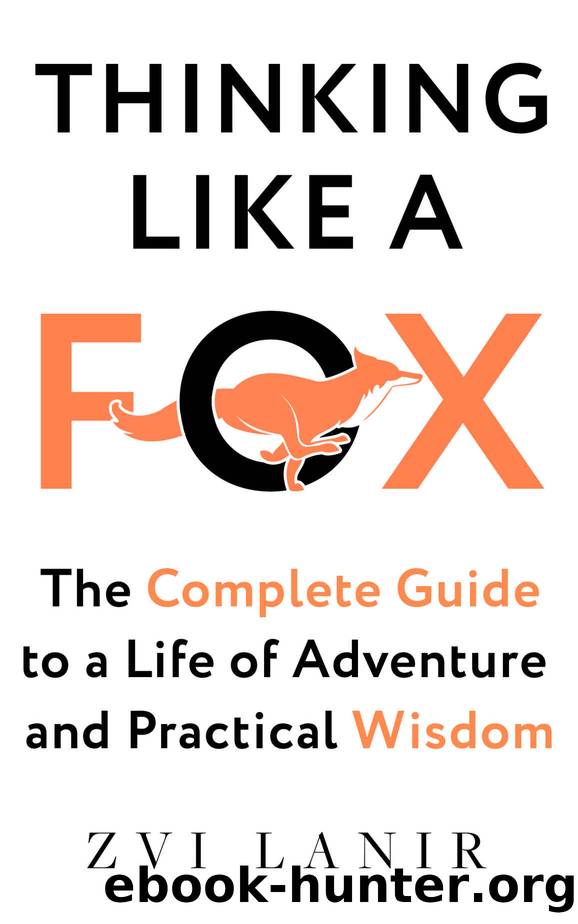Thinking Like a Fox: The Complete Guide to a Life of Adventure and Practical Wisdom by Zvi Lanir

Author:Zvi Lanir [Lanir, Zvi]
Language: eng
Format: epub
Published: 2023-03-04T23:00:00+00:00
* * *
21 I expanded on this subject later in my book A Young Kibbutz with a Conceptual Crisis: Ramat Efâal, T. Lanir, (1990)
Note 19
A Fox of Words
Like Mr. Webster, the acclaimed hedgehog, I too, as a fox, am sensitive to language. But my sensitivity is vastly different from his. Webster was sensitive to the correct, dictionary-based words, while I find myself sensitive to incorrect languageâslang; the linguistic inventions created by children, but also by adult foxes.
In the â70s, I commanded an intelligence unit that worked together with elite special units that carried out operations behind enemy lines. It was this way that I came to know these units up close, living in close quarters with their members for no small amount of time. From this vantage point, I could also compare the units to one another and learn what was so unique about each.
There was a constant competitive air among the unit members as to who would get to participate in the operations, and the success of the missions was the main scale of the competition.
The unitâs success was usually attributed to the quality of the command, the level of discipline, their motivation, training, and so forth. I noted another, hidden attribute that was directly correlated to success, and that was how rich and dynamic its own unique slang lexicon was.
In addition to general military slang and the more specific combat slang, each of the special units, and sometimes even the individual teams within them, developed their own slang. For this reason, new words were invented, or in most cases, new meanings were bestowed on existing words. It became a form of encrypted language that a stranger would not understand, but for the closed circle of the unit members, the words would mean much more than the official army jargon and the literal translation of military terms as they appear in the armyâs official lexicon. This language was more relevant to the unitâs ability to differentiate between unique situations it found itself in, and allowed its members to create accurate, unique observations.
Thus, I was able to examine each new succession of soldiers and their specific unofficial-language contributions. I could even predict that the quality of the unit would diminish when the slang contributions remained stagnant and the old terms went forgotten without being replaced.
The intensity of new terms was mainly characteristic of combat units. In the combat support and staff units I usually found a lesser degree of innovative language. They tended to mimic the older, more common military slang. I suppose that this can show a correlation between the development of slang and being in fast-changing settings, and situations that require working through extreme challenges. Situations such as these are more characteristic of combat units.
When I had the chance to go to the library at the university, I searched, but sadly could not find, academic-scientific papers regarding the relationship between the development of slang and the proficiency of an individual, unit, or organizationâs work.
I found a lead for a philosophical explanation in the language philosopher, Ludwig Wittgenstein (1889-1951).
Download
This site does not store any files on its server. We only index and link to content provided by other sites. Please contact the content providers to delete copyright contents if any and email us, we'll remove relevant links or contents immediately.
Hit Refresh by Satya Nadella(9133)
The Compound Effect by Darren Hardy(8966)
Change Your Questions, Change Your Life by Marilee Adams(7780)
Nudge - Improving Decisions about Health, Wealth, and Happiness by Thaler Sunstein(7706)
The Black Swan by Nassim Nicholas Taleb(7129)
Deep Work by Cal Newport(7083)
Rich Dad Poor Dad by Robert T. Kiyosaki(6632)
Daring Greatly by Brene Brown(6513)
Principles: Life and Work by Ray Dalio(6447)
Playing to Win_ How Strategy Really Works by A.G. Lafley & Roger L. Martin(6304)
Man-made Catastrophes and Risk Information Concealment by Dmitry Chernov & Didier Sornette(6019)
Big Magic: Creative Living Beyond Fear by Elizabeth Gilbert(5771)
Digital Minimalism by Cal Newport;(5764)
The Myth of the Strong Leader by Archie Brown(5507)
The Slight Edge by Jeff Olson(5417)
Discipline Equals Freedom by Jocko Willink(5389)
The Motivation Myth by Jeff Haden(5212)
The Laws of Human Nature by Robert Greene(5208)
Stone's Rules by Roger Stone(5087)
